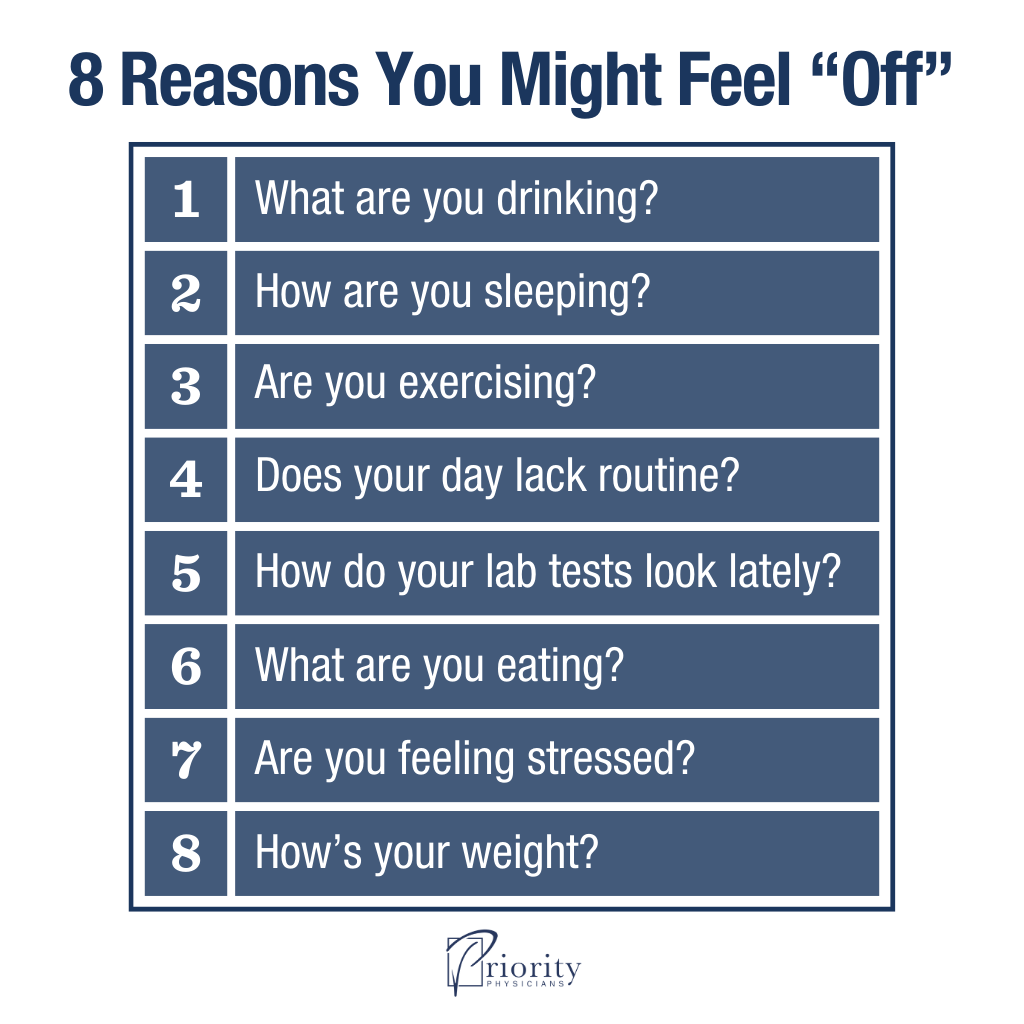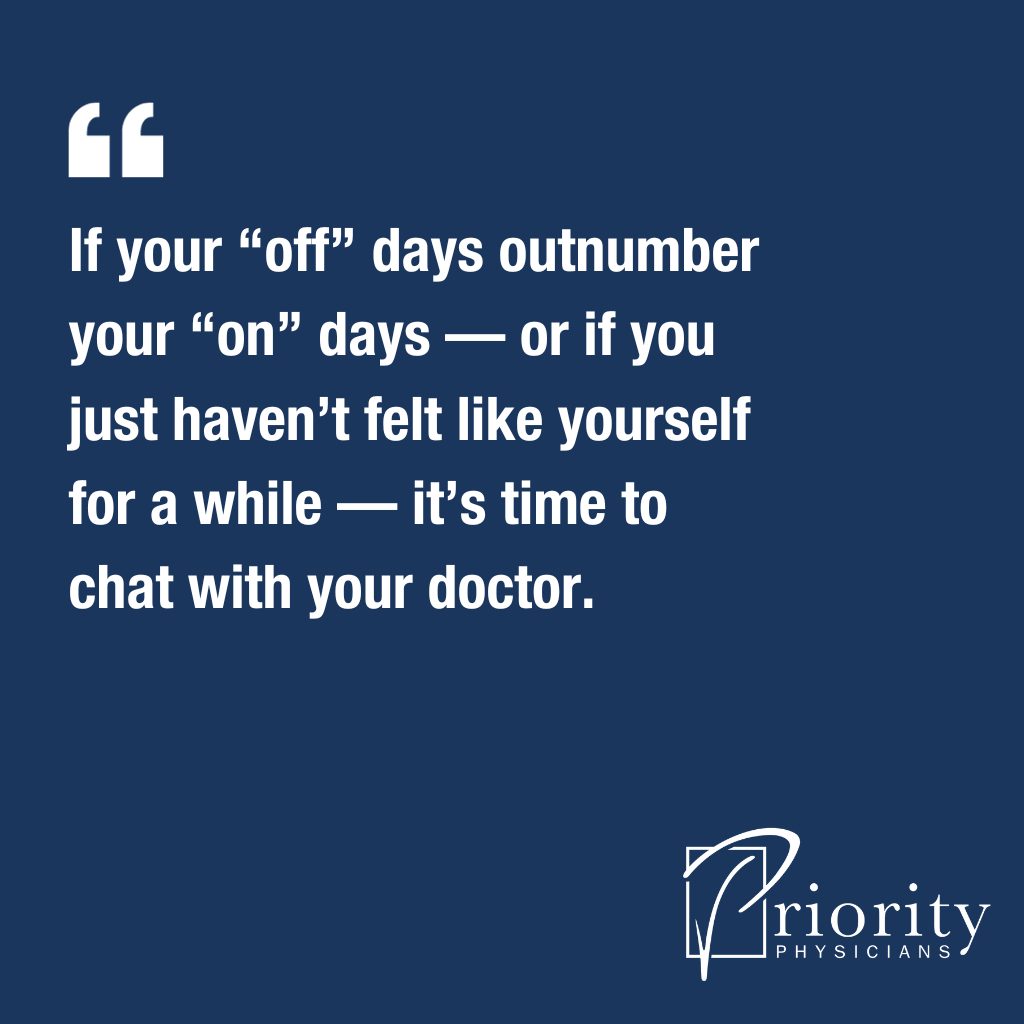One of the questions I hear most often from patients is, “Why do I feel off?”
We all experience a random “off” day once in a while. Maybe you feel fatigued or run down. Perhaps it’s hard to get motivated on a particular day, or you have a classic case of brain fog. Typically, by the next day, your energy returns, and you feel like yourself again.
But if your “off” days occur frequently — or if an “off” day stretches into an “off” week — it’s normal to wonder what’s going on.

8 Reasons You Might Feel ‘Off’
As you move from your 30s into your 40s and 50s, it becomes harder to bounce back from activities you recovered from effortlessly in your younger years.
Here are eight common scenarios that could explain why you’re feeling “off” these days:
Reason #1: What are you drinking?
As you exit your 20s, it becomes more difficult to indulge like you used to. Did last evening include alcohol? If so, your sleep cycles were likely disrupted, even if you got eight hours, regardless of whether your hangover is mild or severe.
And what about caffeine? Many people don’t realize caffeine is a drug the body craves with continuous use. If a day comes when you have fewer caffeinated drinks than usual, you may feel jittery, tired, or cranky.
Reason #2: How are you sleeping?
How you spend your sleeping hours affects how you feel during your waking hours. Unfortunately, we don’t always get seven or eight hours of high-quality slumber. Medications, allergies, illness, diet, stress — any of these might interfere with your sleep cycles and cause you to feel “off” the following day.
For those inclined to try wearable tech, many options — the Oura ring, the WHOOP band, the Apple Watch, etc. — track sleep cycles and how much sleep you’re getting. But remember, when it comes to sleep, quality is just as important as quantity.
Reason #3: Are you exercising?
Exercise increases serotonin, a natural antidepressant, within your brain. It boosts your mood and can help you get much-needed sleep, too.
We all have days when we feel we don’t have the energy to exercise, but those are the days when it’s most important to try. If you’re feeling “off,” exercising may give you more energy.
Reason #4: Does your day lack routine?
Humans are creatures of habit. Your body wants to know what to expect from you each day so it can prepare and maintain the right energy reserves. Leading an erratic lifestyle in which every day is different could lead to an “off” feeling.
Establishing and following a solid routine for when you eat, sleep, and conduct typical activities can benefit your body and stabilize your moods.
Reason #5: How do your lab tests look lately?
Your body likes to keep its natural chemicals within a narrow range of “normal.” If you’re habitually tired, foggy-brained, or just feeling poorly, there could be dysfunction somewhere in the body — in the liver or kidneys, for example. If your blood count is out of balance, you could be anemic, or your electrolytes could be dysregulated.
If you routinely feel “off,” we like to check your most recent lab tests and bloodwork — or run new ones — to rule out potential issues within vital body systems.
Reason #6: What are you eating?
Drastically switching up what you’re eating or adopting fad diets may disrupt your internal homeostasis and leave you feeling out of sorts.
Avoid eating the same things every day. Incorporate a variety of healthy foods into your daily diet. Consume everything in moderation. Try to get your nutrients and vitamins naturally, via these healthy food groups, rather than through supplements.
Reason #7: Are you feeling stressed?
Although stress can be a serious mental burden, it’s not just “in your mind.” It can take a very real toll on your body as well.
Stress increases the hormone cortisol, which can have a far-reaching effect on the immune and digestive systems, as well as on the area of the brain that controls mood and motivation. The result: You’re often not yourself when stressed.
Profound or prolonged stress — for example, a job loss or a severe disruption that throws off your normal routine — can impact how you manage your work or your relationships.
Find a good way to help process stress — exercise, meditation, reading, whatever works for you — and do more of it as needed.
Reason #8: How’s your weight?
Excess weight encourages a pro-inflammatory environment within the body, and that inflammation can be harmful.
Adipose tissue (body fat) stores energy and is actually metabolically active, communicating via hormone signals with other vital organs. Excessive body fat affects your health and mood.
Many people don’t realize how much better they’d feel by losing 20 pounds. It’s not just about regaining energy; it’s about discouraging inflammation and realigning hormones as well.

Flip Your Switch Back to ‘On’
Feeling “off” is something you can expect occasionally as you age.
But no one knows you as well as you do. If your “off” days outnumber your “on” days — or if you just haven’t felt like yourself for a while — it’s time to chat with your doctor.
Through the concierge medical model, we can provide you with personalized attention, managed preventive care, and 24/7 direct physician access. Reach out to us. We’ll help you flip your “off” switch back to “on.”

